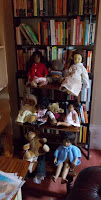In 2013 I wrote a post asking the question Does The Use Of Colons And Semi-Colons Date Your Style?
It still seems to me a relevant question
IT occurred to me again as I
Some people do seem to have problems
with the use of colons and semi-colons. But really it’s not so difficult: we can
use the colon to provide a pause before introducing related information,
while we may use the semicolon to create a break in a sentence that is stronger
than a comma but not as final as a full stop.
But there are times when we as
writers need to stand back a little.
Recently I asked a friend – a good
editor – to cast a final eye over a story I'd been polishing making it ready
for a prestigious competition.
My friend said many very good things
about the story, then hesitated.
‘What is it?’ I say, with writerly
anxiety.
‘Well. The colons and the
semi-colons…’
‘What about them?’ I am defensive. I
love these subtle tools of syntax.
‘Well, somehow, I’m stubbing my toe
on them.’
My eyes narrow. ‘They’re all
correct.’ I say.
‘Well somehow they look…’ she
hesitates. ‘It’s different with essays and factual. In fiction they look…’
Then it dawns on me. ‘…dated, old
fashioned?’
She colours, ‘Well, not quite…’
But that’s certainly what she means.
I really, really hate to think that
my style might be dated. I like to think I have an open mind: a fresh view of
the world in my work. Each novel, each story is a fresh adventure for present
day audiences to read. I like to think my writing reflects this for my readers.
I hope it does.
I went through my story again,
reviewed the colons and semi-colons and removed two of them. I’m not sure
whether or not it was an improvement. I have no answer as yet to this dilemma.
We’ll see
Do you bother about colons and
semi-colons?
 |
Colons and semicolons galore in THE PATHFINDER |
5 Star Amazon Review
‘The past has never felt so real as in the last days of
Roman Britain and the uneasy peace between natives and conquerors portrayed in
Wendy Robertson's 'Pathfinder'. Heroine Elen is a beautifully drawn character
uniting natives with the conquerors.
Pathways lead in two directions and fey Elen's 'honeycomb' mind leads back
centuries into the mists of time. But she is young and resourceful and her
ordained path leads from her beloved coastal marshland of West Briaininto Roman
Gaul when the Roman leader of Britain Magnus Maximum falls I love with the
native girl, drawing her father and warrior brothers into his military schemes.
The novel is filled with believable,fascinating characters including Aunt Olwen a drowned spirit, song-writer brother Lleu and Quin the faithful Roman devoted to both Elen and Magnus Maximum.
It is a delightful, thought provoking read and I could not put it down. So many questions answered so many tantalisingly left. Elen has a future in her homeland and I want to know more.’
The novel is filled with believable,fascinating characters including Aunt Olwen a drowned spirit, song-writer brother Lleu and Quin the faithful Roman devoted to both Elen and Magnus Maximum.
It is a delightful, thought provoking read and I could not put it down. So many questions answered so many tantalisingly left. Elen has a future in her homeland and I want to know more.’










